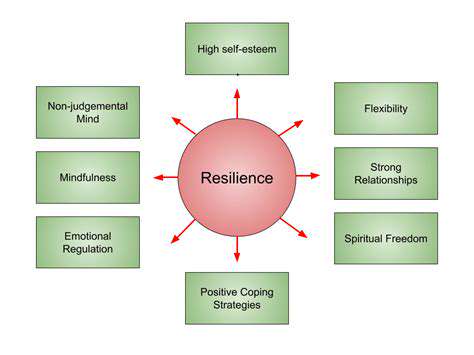Best Tips for Staying Organized for Less Stress

Creating a Routine and Sticking to It

Establishing a Consistent Schedule
Creating a routine is more than just a helpful organizational tool; it's a powerful strategy for managing stress and boosting productivity. By establishing a consistent schedule, you're essentially creating a roadmap for your day, week, or month. This roadmap provides a framework that allows you to prioritize tasks, allocate time effectively, and minimize the feeling of being overwhelmed. A structured routine fosters a sense of control and predictability, which can be particularly beneficial for individuals struggling with anxiety or time management issues. This structure also allows you to carve out dedicated time for activities that promote well-being, such as exercise, relaxation, or hobbies.
A well-defined routine doesn't need to be rigid. It can be adjusted and adapted to accommodate unexpected events or changes in your schedule. The key is to develop a framework that works for you and to be flexible enough to make necessary adjustments without losing the overall structure. This adaptability is crucial for long-term adherence to your routine, preventing it from becoming a source of frustration or pressure.
Prioritizing Tasks and Managing Time Effectively
A crucial aspect of establishing a routine is prioritizing tasks and managing time effectively. Identifying which tasks are most important and urgent allows you to allocate the appropriate amount of time and energy to complete them. This prioritization ensures that you're focusing on high-impact activities first, maximizing your output and minimizing wasted time. Tools like to-do lists, calendars, and time-blocking techniques can be incredibly helpful in this process.
Time management is about more than just scheduling; it's about understanding your energy levels and working with them. Recognizing when you're most productive and scheduling demanding tasks during those times will significantly improve your efficiency. Understanding your individual work patterns and adapting your routine accordingly will lead to substantial improvements in your overall productivity and accomplishment.
Furthermore, breaking down large tasks into smaller, more manageable steps can make them less daunting and more achievable. This approach allows for a more focused and sustained effort, contributing to a greater sense of accomplishment throughout the day or week.
Sustaining Motivation and Overcoming Challenges
Maintaining motivation and overcoming challenges are essential for sticking to any routine. It's inevitable that you'll encounter setbacks or moments of discouragement. Acknowledging these moments as part of the process and developing strategies to navigate them is crucial for long-term success. This might involve building in rewards for completing tasks, celebrating milestones, or seeking support from friends or family.
Maintaining a positive mindset is key to overcoming challenges. Finding ways to stay motivated and energized, perhaps through positive self-talk or engaging in activities you enjoy, is vital to staying on track. Consistency is paramount, and remembering the benefits of the routine will help you navigate difficult periods.
Regular reflection and adjustments to your routine are essential. Periodically evaluating your progress and making necessary adjustments to your approach is vital. This iterative process ensures that your routine remains relevant and effective as your needs and priorities evolve.
Building a Support System for Long-Term Success
Understanding Your Needs
A crucial first step in building a robust support system is understanding your individual needs and the specific challenges you face. This involves introspection and honestly evaluating your current workload, responsibilities, and potential stressors. Identifying these areas allows you to proactively address them and tailor your support system to meet those unique requirements. For example, if you're struggling with time management, a support system might focus on tools and strategies for better scheduling and prioritization. Understanding your personal needs is vital for long-term success and preventing burnout.
Consider what aspects of your life require the most support. Is it your work schedule, family commitments, or personal well-being? Identifying these areas will help you craft a personalized system that addresses all of your needs. It's essential to remember that your support system is dynamic and may need adjustments as your circumstances evolve.
Seeking Internal Resources
Before relying solely on external support, explore the internal resources available to you. This might include colleagues, mentors, or even personal strengths you may have overlooked. Often, individuals underestimate their own capabilities and the assistance available within their immediate network. Seeking guidance from mentors can provide valuable insights and strategies to overcome challenges, and colleagues can offer practical support and collaboration.
Don't underestimate the power of self-reflection and identifying your own strengths. Are you a strong communicator? A detail-oriented planner? Leveraging these internal resources can be a significant component of your support system and empower you to tackle tasks more effectively.
Cultivating External Connections
Building a strong support system often involves connecting with individuals outside your immediate circle. This could be friends, family members, or support groups. These external connections can provide a fresh perspective, offer emotional support, and provide practical assistance. Reaching out to others who understand your circumstances can alleviate feelings of isolation and provide a sense of community.
Consider joining online forums or groups related to your profession or interests. These platforms can connect you with like-minded individuals who share similar experiences and offer valuable support and advice. Building a strong network of external connections is essential for navigating challenges and fostering a sense of belonging.
Establishing Clear Communication Channels
Effective communication is the cornerstone of any successful support system. Establishing clear and consistent communication channels ensures that everyone involved understands their roles and responsibilities. This includes defining how and when to reach out for assistance, providing regular updates, and proactively addressing potential issues. Open and honest communication fosters trust and strengthens the bonds within your support network.
Consider creating a system for documenting tasks, deadlines, and communication details. This ensures that everyone involved remains informed and aligned. Clear communication channels prevent misunderstandings and ensure that everyone is on the same page, ultimately contributing to a more efficient and supportive environment.
Maintaining Flexibility and Adaptability
A successful support system is not static; it needs to adapt and evolve over time. Life throws curveballs, and your support system must be flexible enough to adjust to changing circumstances. Be prepared to modify your strategies and communication channels to meet evolving needs. Recognize that your support system may need adjustments as your personal or professional life changes.
Regularly assess the effectiveness of your support system. Are there areas that need improvement? Are there new needs that have emerged? Staying adaptable and proactive in maintaining your support system ensures that you're always well-equipped to navigate whatever challenges come your way. Maintaining a flexible approach is essential for long-term success.
Read more about Best Tips for Staying Organized for Less Stress
Hot Recommendations
-
*Guide to Managing Gout Through Diet
-
*Best Habits for Financial Well being
-
*How to Build a Routine for Better Mental Health
-
*How to Eat Healthy on a Budget [Tips & Meal Ideas]
-
*Guide to Practicing Self Acceptance
-
*How to Incorporate More Movement Into Your Day
-
*Guide to Managing Chronic Pain Naturally
-
*Guide to Building a Reading Habit for Well being
-
*Top 5 Weight Loss Supplements That Actually Work
-
*Best Exercises for Postpartum Recovery [Beyond Abdominal Work]











